Empowering Craft Brewers with Reliable Instrumentation
Brewery
Rainer Kruppa is a passionate craft brewer who has optimized his own organic-certified Calenberger brewery, ensuring optimal efficiency for up to four brews of 1,200 liters each per day, all crafted according to his personal recipes. In addition to his own beer varieties, Kruppa also produces unique brews for “gipsy brewers” who lack their own brewing facilities. To achieve this remarkable level of production flexibility, Kruppa combines his expertise as a brewmaster with support from Anderson-Negele’s instrumentation solutions.
Drawing from his practical experience, Kruppa has established a secondary venture: a brewery manufactory. He sources old brewing equipment, restoring and modernizing it to create fully functional breweries for local customers. When it comes to his projects in Spain, Southeast Asia, Brazil, and other locations, Kruppa exclusively considers Anderson-Negele as a partner for measurement technology, given their global sales and service network. Together with Anderson-Negele, Kruppa ensures the success of his brewing endeavors while upholding the highest standards of quality and innovation.
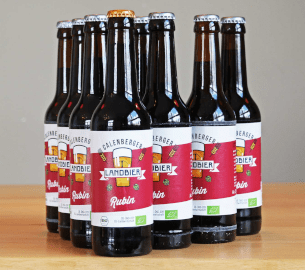 Calenberger Brewery
Calenberger Brewery
Customer
Rainer Kruppa, Owner and Managing Director
More than 20 years ago I bought the first Anderson-Negele sensor. Since then, I have remained loyal to the brand. Quality, service, reliability, everything just fits
— Rainer Kruppa, Owner and Managing Director
Advantages in the application
- All essential measuring equipment for craft brewers from a single source, in the highest quality and reliability
- Large variety of individual sensor types for individual adaptation to each application and installation situation
- High measuring accuracy and easy adaptation to individual recipes and processes
- Very good personal support on site and worldwide sales and service network for their international projects
Application Detail
Rainer Kruppa is a passionate craft brewer who has optimized his own organic-certified Calenberger brewery, ensuring optimal efficiency for up to four brews of 1,200 liters each per day, all crafted according to his personal recipes. In addition to his own beer varieties, Kruppa also produces unique brews for “gipsy brewers” who lack their own brewing facilities. To achieve this remarkable level of production flexibility, Kruppa combines his expertise as a brewmaster with support from Anderson-Negele’s instrumentation solutions.
Drawing from his practical experience, Kruppa has established a secondary venture: a brewery manufactory. He sources old brewing equipment, restoring and modernizing it to create fully functional breweries for local customers. When it comes to his projects in Spain, Southeast Asia, Brazil, and other locations, Kruppa exclusively considers Anderson-Negele as a partner for measurement technology, given their global sales and service network. Together with Anderson-Negele, Kruppa ensures the success of his brewing endeavors while upholding the highest standards of quality and innovation.
The application
The Calenberger Brewery is equipped with state-of-the-art instrumentation, which is truly remarkable considering the size of the company. This level of technology enables Rainer Kruppa or his son to efficiently manage the entire produc-tion process as a “one-man business” while still maintaining the utmost level of individuality and customization. During the design phase of the plant, Kruppa prioritized innovative production techniques and sustainability as the key criteria. As an illustration of this commitment, Kruppa developed a unique method for direct mashing-in, and energy-saving measures were implemented to recover almost 100 % of the energy from the wort boiler. In his pursuit of these innovative solutions, Kruppa found the ideal measurement technology partner in Anderson-Negele.
The appropriate instrumentation for every process
- A wide variety of sensors are operating at the Calenberger Brewery to ensure efficient production. Based on his more than 20 years of positive experience, Rainer Kruppa relies on Anderson-Negele products for temperature, pressure, level, flow and conductivity sensors. In addition to the wide range of applications, he considers the ease of product customization to meet individual requirements as a major benefit. Kruppa says:
"I design and configure each sensor for each individual application and take maximum advantage of Anderson-Negele‘s wide range of variants."
For example, TS Temperature Sensors are used in diverse variations. First as a flush-mounted version in the lauter tun to precisely control the brew temperature despite the movements of the rake arms. During mashout, on the other hand, the temperature of the hot water supplied is monitored directly downstream of the FMQ Flowmeter in the pipe. Here Kruppa employed a long, tapered temperature probe to obtain the shortest possible response time. Finally, in the various vessels in the brewhouse or fermentation cellar, long, robust standard probes are used to precisely determine the core temperature in the vessel.
Highest precision required for the self-designed mashing system
Rainer Kruppa‘s inventive spirit is evidenced by several techniques he developed himself:
"Our direct mashing-in is really something special. Here, milling, grist conveying and mashing-in take place fully automatically in a single process."
The malt grist is fed to the mash tun via a grist mill with integrated conveyor system. An FMQ Magnetic-Inductive Flow Sensor and a TS Temperature Sensor with an extra short re-sponse time ensure that the quantity, temperature, and flow rate of the water added are exactly as specified. This ensures a consisitent mash quality even with a broad range of brewing recipes.
Lautering: Brewmaster know-how with sensor support
When it comes to lautering, Kruppa‘s sense for a harmonious and, for craft brewers, appropriate combination of brewmaster skills and automated processes is evident. The lautering process itself is monitored with sensing technology, but it remains the eye of the brewmaster that determines the right moment for lautering.
During the lautering process, a D3 Differential Pressure Sensor provides permanent, precise control of the pressure above and below the spent grains cake. Kruppa finds that:
"The electrical differential pressure control with the D3 is many times more practical for installation, maintenance, and servicing than mechanical systems with capillaries"
In addition to the upper pressure port, there is also a flush-mounted TS Temperature Sensor.
Kruppa does not use a turbidimeter to determine the correct moment for lautering. In a brewery of this size, he does not yet see any need for this technology; he considers this to be more useful in larger breweries, where saving a few minutes of time already matters for optimizing the overall efficiency.
Energy optimization with the goal: 75% own electricity
More topical than ever is the subject of energy costs. Here, too, Rainer Kruppa developed several ideas that make him less dependent. Energy saving, energy recovery, and energy management are central starting points for a holistic approach.
The core element for energy recovery is a thermal vapor re-compressor to capture the waste heat from the wort boiler. Its function is monitored by TS Temperature Sensors and HH Pressure Transmitters. Rainer Kruppa is certain:
"Through intelligent production control and energy management, such as the use of the hot water tank for energy storage, and a photovoltaic system for heating and cooling energy currently being planned, we want to achieve the target of 75% of our total energy consumption being generated in-house this year. "
Other applications in the process
In the brewhouse, the fermentation cellar, the filling skid and in the CIP system, additional measuring equipment are used to monitor all processes at all times in the central control station „Braumatik“. This includes TS Temperature Sensors for tanks and process lines as standard equipment, L3 Hydrostatic Level Meters for tank monitoring, LS Level Switches for full and empty vessel detection, FMQ Flow Meters for all process steps, and ILM-4 Conductivity Meters for the CIP system.

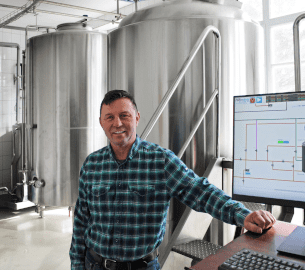
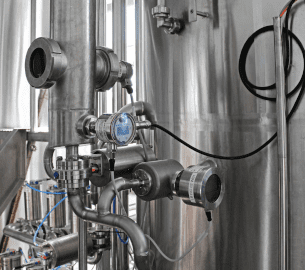
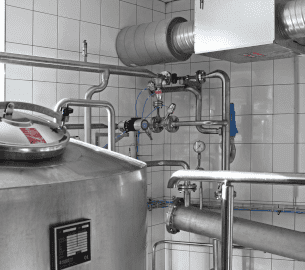
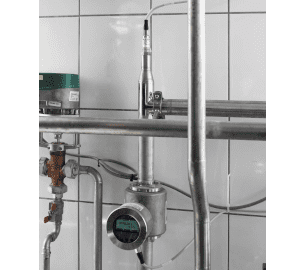
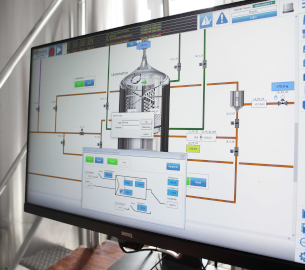
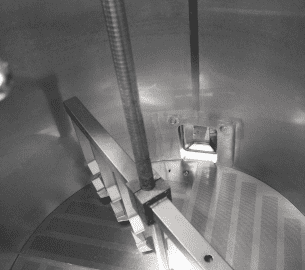

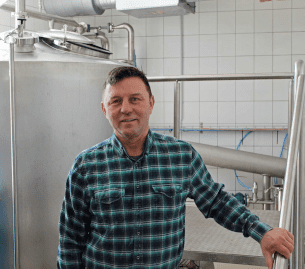

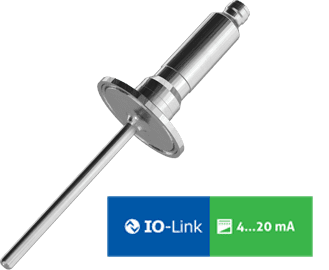
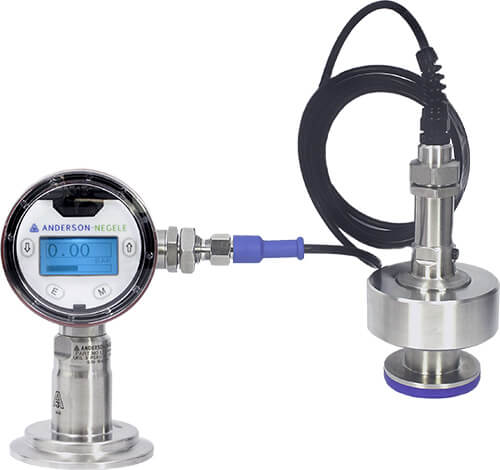
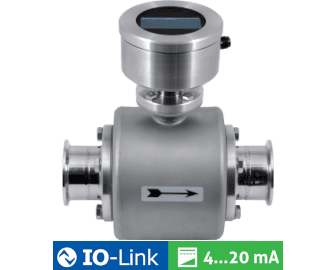

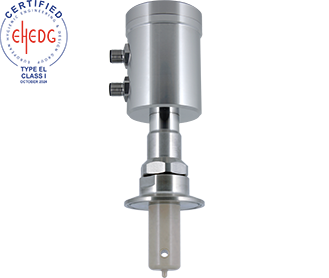
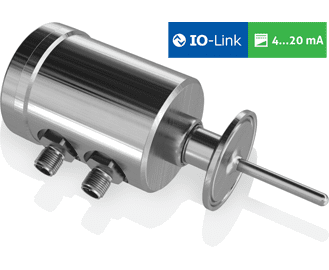

Copyright © 2022 Anderson-Negele